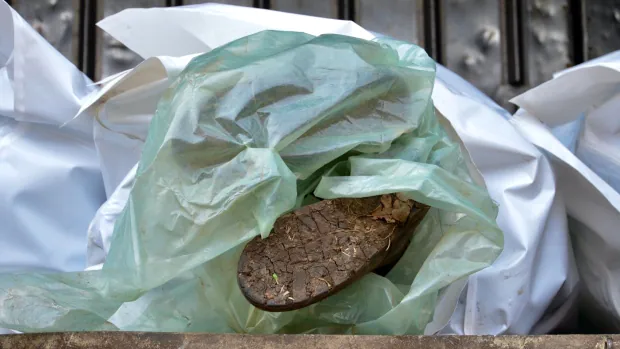Warning: This story contains graphic language and images of human remains
It must have been a cold, lonely, frightening death for Gavril Vanyushev.
The young Russian soldier was killed on the outskirts of Kyiv in a sleepy, forested hamlet about 50 kilometres west of the Ukrainian capital.
Retired schoolteacher Kateryna Karabchuck, 81, said she remembers a wounded Vanyushev wandering into her fenced yard. Her dog had started barking.
The Russian force to which Vanyushev belonged was trying at the time to cut the M06 highway — one of the main roads leading to Lviv in the west — in order to complete an encirclement of Kyiv. His unit was trading blows with Ukrainian forces when he was hit.
The Russians’ mission failed. Bleeding, Vanyushev wandered into the winter-scorched village of Zavalivka before collapsing and dying. Many locals say he was left behind by his unit.
Vanyushev was buried in the forest near Karabchuck’s house, along a trail that winds past a small lake. His temporary grave, dug by the locals, was marked by a pile of branches and surrounded by a handful of discarded vodka bottles.
“I realized this was somebody’s son and I could not sleep at night,” Karabchuck said, her hands shaking as spoke to international journalists through a interpreter.
She said she knew nothing about the Russian soldier except that he looked as though he’d come from far away, perhaps from Siberia. Her kind, happy face turned stern as she described the terror of the fighting that raged around her village last winter.
She said she saw a Russian “tank” on one side of the nearby pond, with Ukrainian troops, including territorial defence reservists, on the other side. “They were shooting at one another,” she said.
The tank, she said, seemed to lose its way, found itself at the dead end of her street and then left.
Vanyushev may have been wounded in that exchange. No one in the village seemed sure. Other than a flash of compassion for his mother, Karabchuck and her husband held little sympathy for the young soldier, who might have been in his early 20s.
“It was our people who buried him because the Russians just left him,” she said. “A dog found his body. He died like a dog, so I guess that was his fate.”
For the last several weeks, an ad hoc team of Ukrainian soldiers has been revisiting the fresh battlefields around Kyiv to gather the dead. The Ukrainians say they have recovered the remains of roughly 200 Russian soldiers across the country.
On Wednesday, that team visited Zavalivka after receiving a call about the body buried in the forest. The Ukrainian troops were accompanied by a group of international media who went along to document the painstaking exhumation — a very public demonstration of how the country says it is living up to its international obligations.

“It’s not pleasant work, for sure,” said Col. Volodymyr Lyamzin, the head of Ukraine’s civil-military affairs branch. “No one loves to do this, but they understand it is part of the job.”
Most of the time they find themselves exhuming remains from hastily-dug graves, which they photograph extensively and geotag to record the location.
Lyamzin said Vanyushev was found face-down and partly wrapped in blue canvas. His identity papers had been collected by the locals who buried him, he added.
The troops, clad in white hazmat suits, carefully scraped away the damp, dark soil surrounding the body as a light smell of death and peat moss hung around them.
The grave offered possible clues to his fate. The Ukrainians pulled an improvised tourniquet from the ground. They found caked blood near Vanyushev’s hip.
Using spades, they carefully cleared the area around the body before carefully lifting it into a white body bag.

He was carted back to Kyiv to a nondescript railyard and loaded into a grey refrigerated rail car where the Ukrainians have stored the bodies of 136 dead Russian soldiers awaiting repatriation.
The problem, Lyamzin claims, is that Moscow has been reluctant to accept remains collected on Ukrainian battlefields.
“Russia does not seem interested at all,” he said, noting that the Geneva Convention has provisions for the exchange of remains.
‘We couldn’t show them to their mothers’
Only one such swap has taken place in the war to date. Lyamzin said the badly decomposed state of the Ukrainian soldiers’ bodies returned home made it impossible to positively identify them.
“We couldn’t show them to their mothers,” he said through an interpreter.
At the end of March, Ukraine exchanged six dead Russians for two live prisoners of war.
The government in Kyiv has said it is prepared to keep collecting bodies and wait for them to be exchanged. At some point, it is going to have to consider reinterring the Russians if no one claims them.
Once Vanyushev’s body was loaded into the rail car, the Ukrainian troops searched his pockets one last time. They found his bank card and a credit card, which they held up for the cameras.
It was a brief glimpse of an ordinary life extinguished by a brutal war, set against a macabre backdrop of a growing pile of white body bags.
Lyamzin took in the whole scene with an indifferent eye.
“I don’t have any pity for them because they come to my country, they killed the kids and rape our women,” he said.
“They have their brains, so they knew what they [were doing]. They were aware [of what they were] doing — a crime. So, I cannot have any pity [for] them.”


